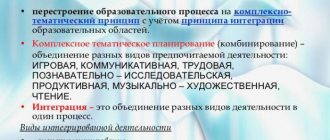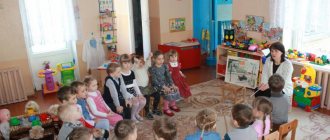The upbringing of preschool children is the common goal of all employees of children's educational institutions. It is achieved by solving many smaller interrelated problems. Since teachers are given priority to the continuity of the educational and educational process in preschool institutions and schools, solving these problems is equally important for both preschool employees and primary school teachers.
The main goal of education in a preschool educational institution is to obtain a comprehensively developed, free, socialized and successful personality. To do this, it is necessary to combine the efforts of many representatives of the teaching profession working in a children's educational institution. The result of such work should be getting what you want, that is, children graduating from kindergarten who are fully prepared for school, independent, socialized, and formed as creative, free individuals. To do this, it is necessary to correctly determine the main tasks of the teacher and successfully solve them.
What are the main tasks of a teacher’s work?
A typical regulation on a preschool educational institution rather dryly formulates the following main tasks of the activity of a preschool teacher:
- Ensuring cognitive, speech, social-personal, artistic and physical development of pupils.
- Fostering love for the Motherland, family, surrounding nature, respect for freedoms and individual rights, taking into account the age of the student.
- Correction of existing deficiencies in the upbringing and behavior of preschool children.
- Protecting life, ensuring safety, strengthening physical and mental health.
- Interaction with parents or guardians of pupils to ensure the full development of children.
- Providing methodological assistance, conducting consultations with parents or guardians of pupils on various issues of training and education of preschool children.
In this document, the main educational objectives are formulated extremely briefly, in a concise form. In fact, each point contains a lot of additional tasks, successfully solving which is vital to achieving the main result.
What is preschool pedagogy?
Preschool pedagogy
is a branch of general pedagogy that includes research into the theory of upbringing and teaching preschool children and involves the use of special tools and methods. Preschool pedagogy became an independent science only in the 19th century.
The main object of preschool pedagogy is the child from the moment of his birth to the school period. It is at this time that children form concepts and beliefs that will have a direct impact on the entire subsequent life of a person, therefore, educators and teachers of preschool educational institutions have a huge responsibility.
The main categories of preschool pedagogy are education, development, training and formation. If we reveal their essence in more detail, then:
- education
consists of purposeful, systematic and organized actions for the development and formation of the child’s personality; - development
involves quantitative and qualitative changes that occur with age under the influence of the educational process; - formation
- an organized process of managing a child’s life activity under the influence of educational measures, education and the social environment; - learning
is a detailed planned process of transferring knowledge, skills, and behavioral characteristics from teacher to child.
Features of fulfilling the main tasks of a teacher
Clearly formulated tasks facing kindergarten teachers make it easier to carry out their complex and responsible work. However, their competent solution is impossible without the main condition - love for children. Each educator must, first of all, be a person who is completely devoted to his work, then the difficulties that often occur in educational activities will not become obstacles for him.
In their work, each teacher actually solves one main task - to form and educate a full-fledged, self-sufficient creative personality. Preschool age is the most favorable time for this. Children who come to kindergarten perceive any information well, and an adult with authority serves as a role model for them. That is why it is important for educators to become such a model together with the parents and other close relatives of the pupil.
And this indicates the fact that in achieving the main goals of education, preschool teachers and educators have to devote a lot of time and effort not only to working directly with children, but also to engage in their own development. A teacher cannot stop at any stage of self-education and self-study, otherwise he will hopelessly lag behind the constantly developing and progressing pedagogical science. Solving the most important problems of upbringing and education is directly related to professional literacy, teaching experience and the ability to apply the acquired progressive skills and abilities in practice.
To solve the main tasks facing every preschool teacher, you will need the following:
- Excellent professional training. The state has made sure that our children are raised by people with secondary or higher pedagogical education, which already provides the necessary professional base.
- Constantly improving the level of qualifications. For these purposes, certification is used as a way to verify the professional suitability of a teacher, as well as passing advanced training or retraining courses that ensure a modern level of professional teaching skills.
- Participation in various competitions, master classes and competitions also serves to grow the teacher’s professional talent and develop his innovative capabilities.
- Working with parents. This is an important point in light of achieving the main tasks of a kindergarten teacher, since both the family and the preschool educational institution must act as a united front, follow common educational methods and support each other to obtain maximum effect. Often this point is one of the most difficult to achieve, because families are all different, and not all of them want to listen to the recommendations and advice of employees of a children's educational institution.
A kindergarten teacher is required to have many different knowledge and skills. For example, to solve the problem of preserving the health and safety of children, he must know perfectly all the requirements of the instructions for protecting the lives of pupils. For your own safety and the protection of other adults, you must strictly follow the safety instructions for educators. In addition, he needs to have basic knowledge of other professions, for example, be able to identify a sick child in order to isolate him and prevent an outbreak of the disease in the entire team, understand how to provide first aid to the victim, and much more. All this requires constant work on yourself.
Solving the main tasks of raising children in a preschool educational institution for a teacher means constantly improving their knowledge, achieving significant pedagogical success, and developing personal qualities and talents.
Goals and objectives of preschool teachers
The main goal of preschool education will be to promote self-realization and development of each person in a civilized society, therefore, teachers and educators in kindergartens try from an early age to introduce children to universal moral, cultural and educational values - kindness and honesty, love of neighbor, respect for parents , to hard work and diligence, curiosity and improvement of personal qualities, to mutual respect in relationships with other people, to responsibility, discipline and creativity.
Based on the goals, the most important tasks of preschool pedagogy will be:
- assess the personal qualities that can be developed in a child during the preschool period;
- justify the types and methods of educational activities;
- organize the educational process so that the child’s creative potential acquired in kindergarten is preserved throughout his entire education at school.
Of course, preschool age is a key period in the development of a child, therefore preschool teachers bear a huge responsibility to society, and in order to perform their tasks efficiently, they must have certain skills and competencies. Teachers at our academy will help you gain the necessary knowledge in the field of preschool pedagogy and psychology and master the profession of a preschool teacher (primary school teacher) in a professional retraining course.
And we will tell you what methods teachers use when working with preschoolers.
When setting goals and objectives for educational activities, remember! material on the topic
REMINDER
for preschool teachers
When setting goals and objectives for educational activities directly, remember:
- The goal is always the same.
- The tasks should be of a triune nature, i.e. should include an educational, developmental, educational orientation. In this case, there may be more than three tasks themselves.
- The formulation of educational objectives must correspond to program objectives and must begin with a verb.
- The choice of the right verb depends on the nature of the GCD you are planning: by communicating new knowledge, training or final.
Approximate formulations of educational objectives of GCD for communicating new knowledge:
“Update children’s knowledge about...”
“Create conditions for children to gain knowledge about...”
“Motivate children to study independently...”
“To give children the opportunity, with the help of an adult, to learn about...”
“To formulate in children the need to correctly use possessive pronouns in their own speech”
Approximate formulations of educational objectives of GCD of a training and final nature:
“Update children’s knowledge about...”
“Expand children’s knowledge0 ... through organizing independent experimental activities”
“To provide an opportunity to put into practice the acquired knowledge about...”
“To consolidate the ability in independent activities...”
- Developmental tasks are aimed, as a rule, at the development of higher mental functions (thinking, memory, imagination, attention), general, fine, articulatory motor skills, prosodic components of speech (voice, rhythm, tempo, intonation), speech breathing.
- The formulation of developmental objectives must correspond to program objectives and must begin with a verb.
- Depending on the extent to which the children have developed the function you want to work on, the choice of verb will be made:
- - if the function has not been formed, then the task will begin with the words “form ...”, “begin work on development ...”, etc.
— if the function is not sufficiently formed, or it is necessary to consolidate some skill, then the choice will be “continue to form...”, “continue to develop...”, “improve...”, etc.
- Educational tasks are, as a rule, aimed at developing the child’s personal qualities and his emotional and volitional sphere.
- The formulation of educational objectives must correspond to program objectives and must begin with a verb.
- Depending on the extent to which children have developed the quality (property) that you want to work on, the choice of verb will be made:
- if the quality (property) is not formed, then the task will begin with the words “form ...”, “educate ...”, etc.
- if the quality (property) is not sufficiently formed, or it is necessary to consolidate it, then the choice of verb will be “continue to form ...”, “continue to educate ...”, “improve ...”, etc.
When planning the course of direct educational activities, remember:
- The GCD should include the following main stages:
- Organizing time;
— updating existing knowledge;
- communicating the purpose of the educational activity (in a form accessible to children), in order to motivate children to be active during the educational process;
- communication of new knowledge, or training in the use of new knowledge in children’s own practical activities (depending on the nature of the educational activity);
- the result of the GCD.
- The inclusion of allocated physical minutes in the course of ECD is not necessary if during the ECD there is a constant change in types of activities.
During the GCD, remember:
- At any moment, children can offer you an educational and developmental situation that is not in YOUR plan. Don't miss it. Remember the proverb “A spoon is the road to dinner” and don’t be afraid to deviate from your notes! Children will assimilate knowledge acquired at the right time much better.
- Don't rush your children with answers!!!!! Take a break. Try to reformulate your question, because the lack of a child's answer may be due to an incorrectly asked question, and not due to ignorance.
- Never ask a question that can be answered with “yes” or “no.” It is pointless.
- Don't rush to answer children's questions. Try asking him in response: “What do you think?” and listen carefully to the child’s assumption, and then, together with him or with others, find the answer to the question in various sources or by conducting some kind of experiment.
- Provoke children to ask questions, especially at the stage of fixing difficulties in something. "You do not know? But what to do when you don’t know something? (“You can ask someone”) Ask me!”
When summing up the GCD, remember:
- Questions should not be aimed only at children retelling the main stages of an educational event.6 “Where were we?”, “What did we do?”, “Who came to visit us?” etc.
- Use more problematic questions, such as “What allowed us to help the bunny?”, “Why did we do this?”, “Is what you learned today important?”, “Why is this useful in life?”, “What was the task?” the most difficult thing for you? Why?”, “Which task did you like best? Why?”, “What would you like to tell the guys, Masha?”, “What should we do next time?”, “What will you tell your parents about our game today?” etc.
- Don’t praise all the children every time with the words “You’re all great!” Celebrate the specific merits of EACH child: “Dima, you came up with a great idea on how to cross the river”, “I was very pleased to see how Polina and Sasha agreed on who would draw first”, “Marina did a wonderful job of completing a difficult task...”, “Pasha made me happy today. Although he was not very successful in completing the task..., he showed a real example of how to overcome difficulties,” etc.
Enjoy communicating with children and then everything will definitely work out for you!!!





